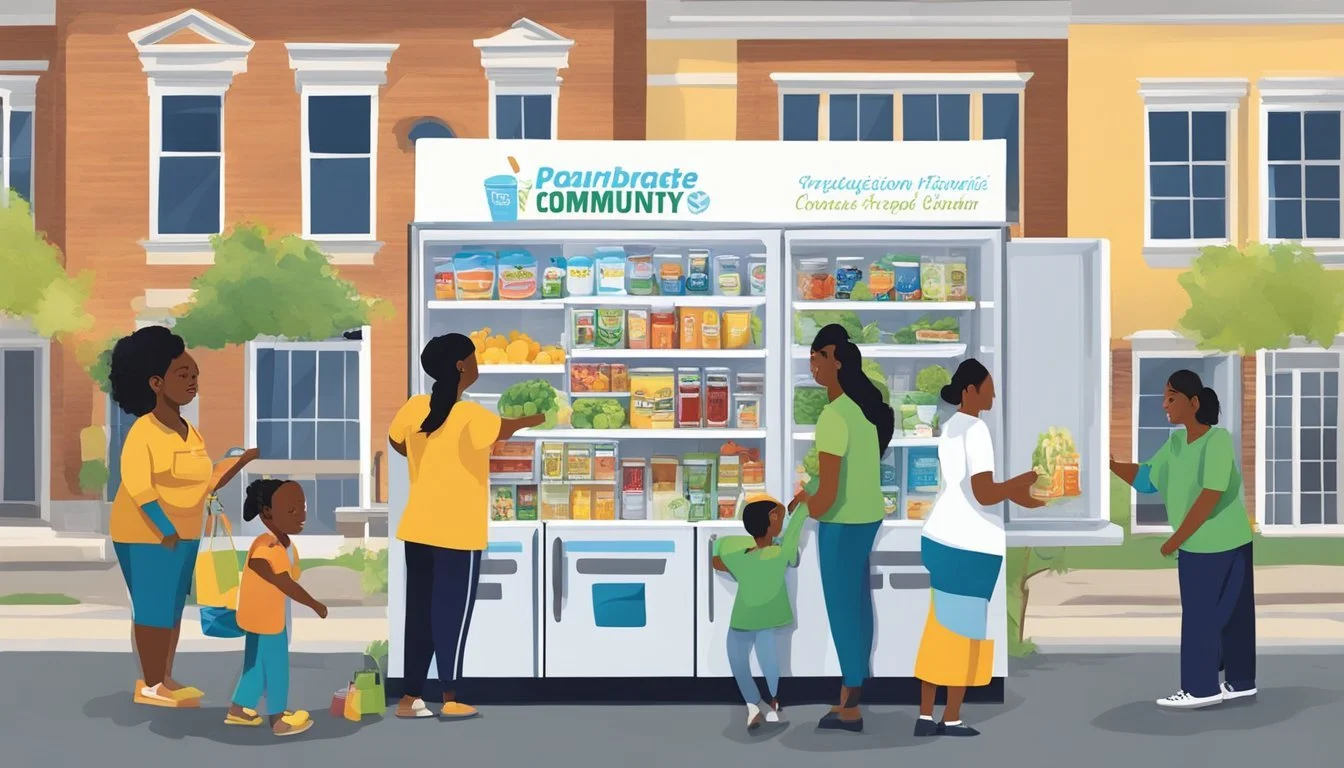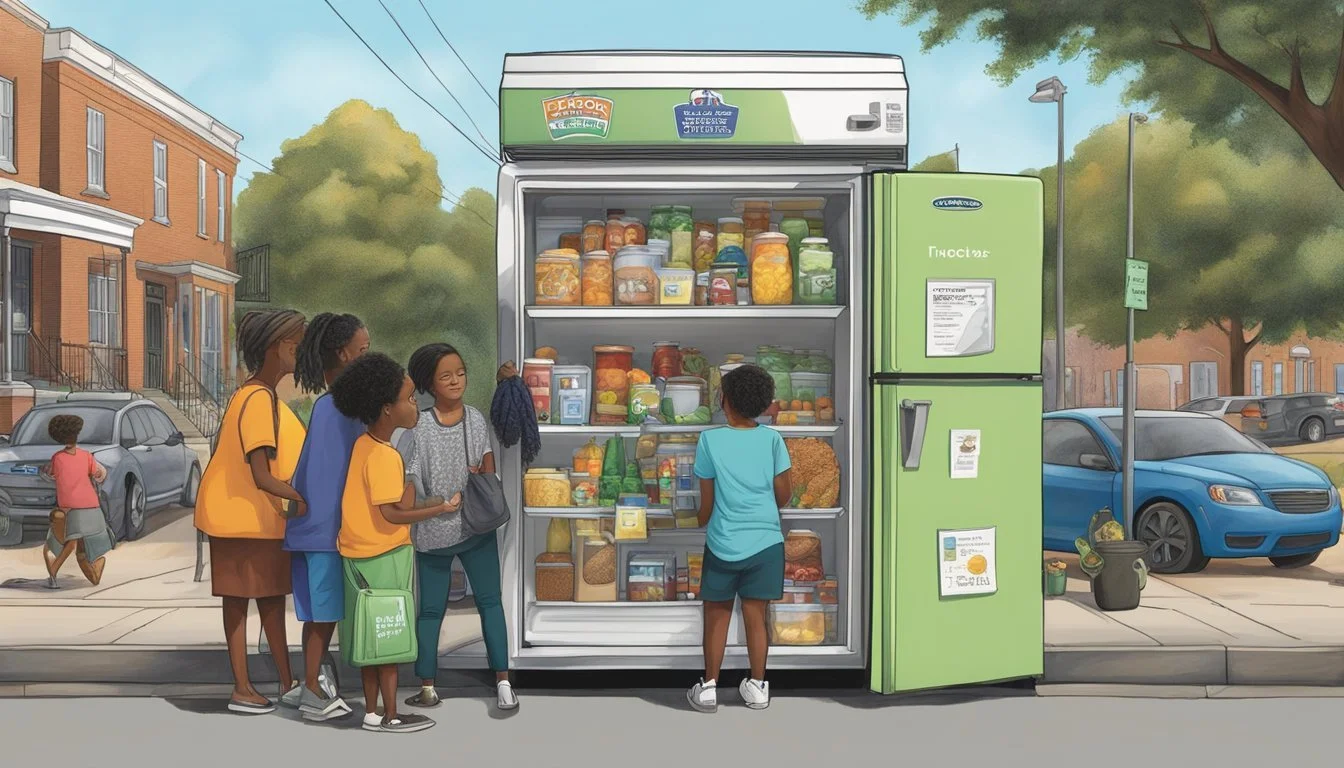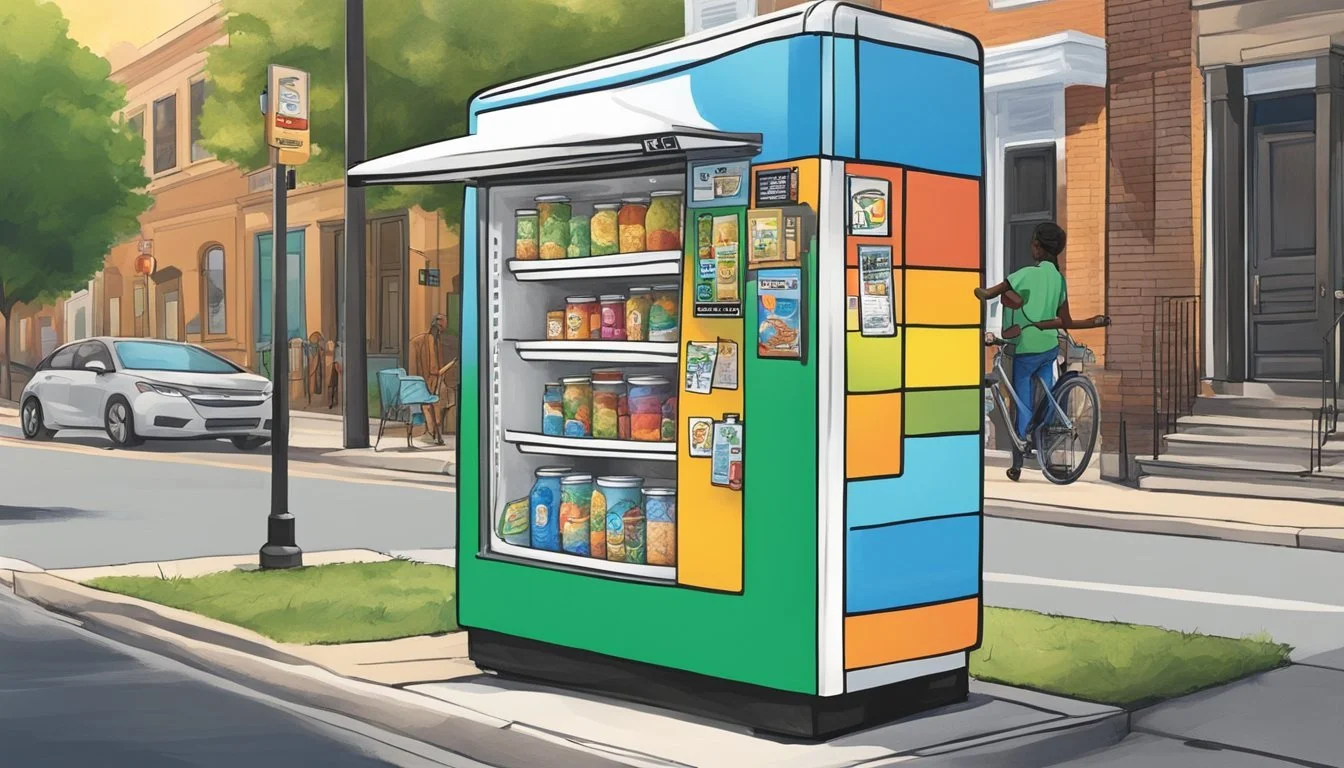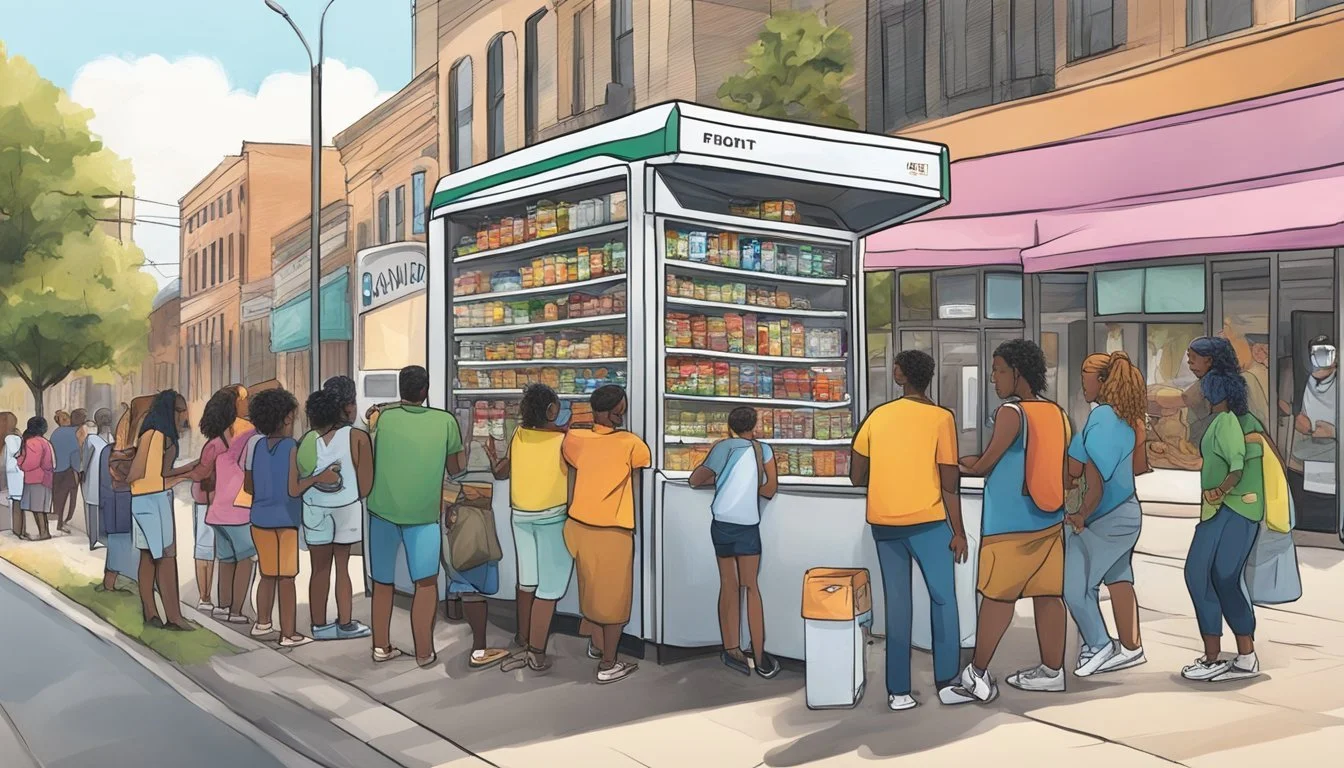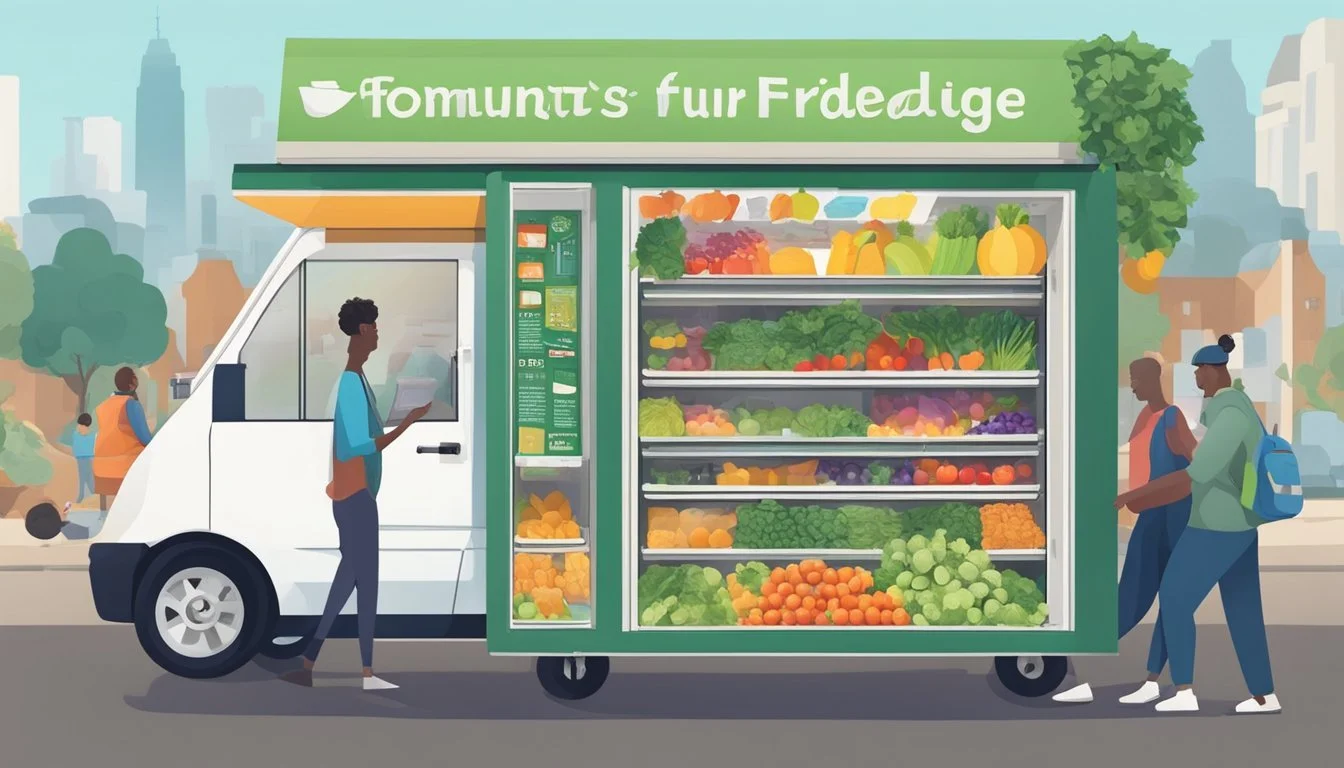Jackson, MS Community Fridge
Initiative Tackles Food Insecurity
In Jackson, Mississippi, community efforts to tackle food insecurity have led to the establishment of community fridges. These fridges are placed in accessible public spaces, allowing residents to share surplus food and ensuring that those in need have easy access to fresh and nutritious products. The concept behind these fridges is simple yet powerful: anyone can leave food, and anyone can take food.
The GRITS Community Fridge in Jackson stands as a testament to the city's commitment to fostering communal support and sustainability. It not only reduces food waste but also serves as a symbol of solidarity, enabling residents from all walks of life to contribute to and benefit from a shared resource. These refrigerators operate on a take-what-you-need, leave-what-you-can basis, making them a valuable resource in the fight against hunger.
Several local organizations and community members have embraced the community fridge initiative, contributing to the creation of a network of fridges throughout the city. This network is dedicated to improving food accessibility and supporting residents who face barriers to sufficient nutrition. It reflects a broader movement, with Jackson as part of a growing list of cities recognizing the importance of community-driven solutions to address food scarcity challenges.
Background and Significance
In addressing food insecurity and reducing food waste, community fridges have emerged as an innovative grassroots solution. These initiatives, driven by community efforts, provide free food access to those in need while fostering a sustainable approach to unused food.
Community Fridge Movement Origin
The community fridge movement began to take shape internationally, with countries like Spain, Germany, and Ireland pioneering these local solutions. In the UK, the concept gained significant attention, exemplifying a community-driven response to food insecurity and surplus food distribution.
Rise of Community Fridges in the US
In the United States, community fridges, often referred to as "Freedges," have seen a notable rise. Initiated by local groups and volunteers, these fridges serve as points where residents can donate or collect food items without any prerequisites, thus combating hunger and food waste simultaneously.
Food Insecurity in Jackson
Jackson, Mississippi, is one of the numerous US cities tackling food insecurity through the installation of community fridges. These fridges are vital in a city where access to affordable nutritious food is a challenge for many residents, illustrating a tangible step towards a more food-secure community.
Local Initiatives and Partnerships
The city of Jackson has recently advanced efforts to address food insecurity through the development of the Jackson Community Fridge Project, a collaboration fostering support among local businesses and organizations.
Jackson Community Fridge Project
The Jackson Community Fridge Project is an emblematic initiative in the fight against hunger, introduced through a synergistic partnership between the City of Jackson, The Jackson Area Council on Alcoholism and Drug Dependency (JACOA), and First United Methodist Church Downtown. They have launched free community fridges to supply fresh produce and food items. This initiative operates primarily at two locations: 900 E Chester St and 200 S Church St.
Support from Local Businesses and Organizations
Local businesses and organizations are essential supporters of the Community Fridge initiative, helping to promote sustainability and ensure consistent food availability. Their contributions, either through donations or volunteering, are pillars that sustain the operational success of these community fridges. The AARP Community Challenge grant of 2022 is a noteworthy contributor, selecting Jackson as a beneficiary among many applicants for quick-action community projects.
Participation and Contribution
Community fridges in Jackson, MS depend heavily on local involvement, where volunteers play a pivotal role and contributions from various sources, including grants, are vital to their success.
Volunteer Engagement
Volunteers are the backbone of the community fridge movement in Jackson, MS. They dedicate their time to ensure that the fridges are clean, well-stocked, and accessible to everyone in the community. Volunteers also engage in awareness campaigns to educate the public about the importance of food sharing and preventing waste.
Key Responsibilities:
Stocking fridges with food
Maintaining cleanliness and hygiene
Organizing food drives
Educating the community
The Role of Local Volunteers
Local volunteers in Jackson take an active role in the day-to-day operations of community fridges. They contribute not just by organizing and distributing food; their participation also includes applying for funds, such as the AARP Community Challenge Grant, which supports projects that enhance livability for all community members.
Funding and Support:
Application for AARP Community Challenge Grant
Coordination for potential Community Challenge Grants
By managing these aspects, local volunteers ensure the sustainability and effectiveness of the community fridges, while fostering a culture of mutual aid that empowers residents and addresses food insecurity within Jackson, MS.
Operational Guidelines
The operational guidelines of the Jackson, MS Community Fridge are designed to ensure health and safety while maintaining a functional space for food sharing. Proper protocols and regular maintenance are critical for the successful operation of the community resource.
Health and Safety Protocols
Community fridges must adhere closely to health and safety regulations to prevent foodborne illness. Volunteers are responsible for conducting regular checks to ensure all items, especially perishable goods like eggs and bread, are safe for consumption.
Eggs: All eggs must be within their use-by dates and kept in a sealed container to prevent contamination.
Seal Check: Volunteers should check that all food containers are sealed properly to maintain freshness and prevent the spread of bacteria.
5 Step Guide to Health: A five-step guide is employed to govern food safety measures:
Check dates and integrity of seals.
Ensure cleanliness of the space.
Sort out any food not meeting guidelines.
Keep a log of food items added and removed.
Educate community members on safe handling practices.
Community Fridge Maintenance
Regular upkeep is necessary to ensure the sustainable operation of the community fridge. Volunteers are the backbone of this effort as they perform several essential tasks weekly:
Cleanliness: The area around the fridge must be cleaned at least once a week, including wiping down surfaces and disposing of any waste appropriately.
Inventory Management: Regular inventory checks should be carried out to remove food that does not comply with safety standards or has passed its consumption date.
The continuous effort by volunteers and adherence to these operational guidelines are the foundation of a community fridge that serves Jackson, MS effectively.
Impact and Challenges
In Jackson, Mississippi, community fridges serve as a practical response to food insecurity and excess food waste. These initiatives face both positive impacts and significant challenges.
Reducing Food Waste
Community fridges in Jackson play a pivotal role in combating food waste. By offering surplus food to those in need, these fridges operate on an honor system, allowing individuals to take what they require and contribute what they can. This cycle not only helps reduce waste but also ensures that the excess food reaches individuals who can benefit from it, thus prolonging the shelf life and utility of food resources in the community.
Impact: Significant reduction in food going to landfills
Method: Redistribution of surplus to those in need
Community Impact and Solidarity Fridges
Often referred to as solidarity fridges or honesty fridges, these freedges are much more than a food-sharing solution. They foster a sense of community by encouraging residents to support one another through shared resources. The Jackson fridges are stocked with not only food but occasionally non-food items that benefit the community, such as baby supplies and hand warmers during winter. These fridges embody the community spirit by relying on collective trust and cooperation.
Solidarity: Encouraging community support
Honesty Fridges: Trust-based food-sharing
Legal and Logistical Challenges
Despite the positive effects, community fridges in Jackson face legal and logistical challenges. Zoning laws, health regulations, and continued maintenance require attention and resources to ensure the fridges remain in operation. Local laws might not be designed to accommodate such community-led initiatives, and their ambiguities can pose hurdles for organizers. Additionally, ensuring a consistent supply of quality donations demands meticulous coordination.
Legal: Compliance with health regulations and zoning laws
Logistical: Sustaining stock and fridge maintenance
Community fridges in Jackson aim to serve the dual purpose of reducing food waste and nurturing community solidarity. Through the continued support and adaptation to overcome legal and logistical barriers, these fridges signify a powerful movement towards food security and waste reduction.
Future Directions
As Jackson, Mississippi continues its fight against food insecurity, the next phases for its community fridge initiative promise to increase accessibility to food resources and leverage technology for enhanced efficiency.
Expanding the Community Fridge Network
The aim to grow the Community Fridge Network includes plans for additional fridge installations in neighborhoods with higher rates of food insecurity. By doing so, the initiative strives to provide a wider safety net for individuals and families struggling to access nutritious food. A focus will be placed on securing sustainable partnerships with local businesses and organizations to maintain a steady supply of donations, thereby feeding America through local efforts.
Critical Locations: Determination of new fridge sites through community assessments.
Partnership Development: Engagement with potential partners lined up for sponsorships.
Incorporating Technology and Information
The integration of technology will serve a pivotal role in enhancing the Community Fridge Network's capabilities. Investments in software to track inventory levels and spoilage will optimize food distribution and reduce waste. Additionally, educating the public about the availability and proper use of the community fridges will ensure they are a valuable community resource. A potential strategy includes:
Inventory Management System:
Real-time tracking of food stocks.
Analytics to predict demand and manage supply.
Knowledge Sharing:
Creation of online platforms for sharing information on fridge locations and donations.
Utilization of social campaigns to promote volunteer opportunities and community engagement.
Case Studies and Models
Community fridges have emerged as an innovative solution to food insecurity, offering free access to food while fostering a sense of mutual aid among participants. They illustrate a model of community-driven support, which has been especially crucial during hard times such as the pandemic.
Jackson Heights Initiative
The GRITS Community Fridge in Jackson, Mississippi, provides an example of how local efforts can reduce waste and address hunger. Volunteers maintain the community fridge and encourage local residents to donate what they can and take what they need. This initiative embodies the spirit of mutual aid, as it operates on the principle that everyone has something to contribute and has a need that can be filled by their community.
International Examples of Community Fridges
Spain: Across Spain, community fridges have been set up to curb food waste while providing for those in need. In a country enjoying a warm climate conducive to fresh produce, these fridges offer a practical solution for sharing surplus.
Germany: Germany has also seen the rise of community fridges, particularly in urban areas where food can be easily distributed to a diverse population. German community fridge projects often function with strict hygiene standards, ensuring food safety for all users.
Ireland: In Ireland, community fridge initiatives are run with the aim of both reducing food waste and easing food poverty. They serve as pillars of support that complement existing social services, adapting to the ongoing needs grounded in the ethos of mutual aid.
How to Get Involved
Engaging with the Jackson, MS Community Fridge initiative offers multiple ways to contribute to the local community. One can either spearhead a new community fridge project or support pre-existing efforts.
Starting a Community Fridge in Your Area
To initiate a community fridge in your area, a thorough understanding of the responsibilities and requirements is key. Interested individuals should:
Identify a suitable location that is accessible and secure.
Connect with local businesses and organizations for possible food donations or sponsorship.
Consult with legal counsel to understand the implications and compliances, including food safety regulations.
Rally volunteers who are committed to the upkeep of the fridge, including monitoring stocks, maintaining cleanliness, and promoting the initiative.
Participating in Existing Projects
For those looking to contribute to existing community fridge projects, here are some direct actions they can take:
Donate Food: Ensure your donations are fresh and safe for consumption. Non-perishable items and fresh produce are preferred.
Acceptable Donations:
Fresh Produce Non-perishable Items Fruits Canned Goods Vegetables Packaged Snacks Bread Bottled Water
Volunteer: Offer your time to restock and clean the fridge, or help organize food drives.
Volunteer Responsibilities:
Monitoring fridge contents.
Ensuring the space remains clean and welcoming.
Engaging the local community to raise awareness.
Spread the Word: Use social media platforms and community groups to inform others about the community fridge location and how they can participate.
Both initiating a new fridge and volunteering necessitate commitment and community coordination to ensure the success of the community fridge.
Additional Resources
When establishing or supporting a community fridge in Jackson, MS, it’s crucial to access comprehensive resources that ensure smooth operation and maintenance. The section below outlines guides for best practices and provides information on organizations that can help in the efforts.
Guides and Best Practices
Feeding America: As a nationwide network, Feeding America offers guidance and protocols for food distribution efforts, which are beneficial for community fridge operations. They have a wealth of experience that can help ensure food safety and effective management.
5 Step Guide: Available resources include a step-by-step guide that outlines the essentials for starting and running a community fridge. These steps are usually distilled into key actions such as:
Step 1: Identifying a suitable, accessible location.
Step 2: Securing food sources and understanding local health regulations.
Step 3: Organizing community and volunteer support.
Step 4: Ensuring the fridge is regularly stocked and maintained.
Step 5: Promoting the fridge to the local community to maximize usage and support.
Organizations to Connect With
In the quest to scale impact and foster a robust community support system for the GRITS Community Fridge in Jackson, MS, networking with other changemakers and organizations is vital.
GRITS Community Fridge Jackson: As an existing local initiative, connecting with them provides practical insights and localized knowledge for running a successful community fridge in Jackson, MS.
Mississippi Department of Education: Although it primarily focuses on education, this department can serve as a resource for outreach and education regarding nutrition and community support through school networks.



